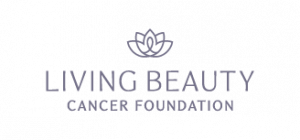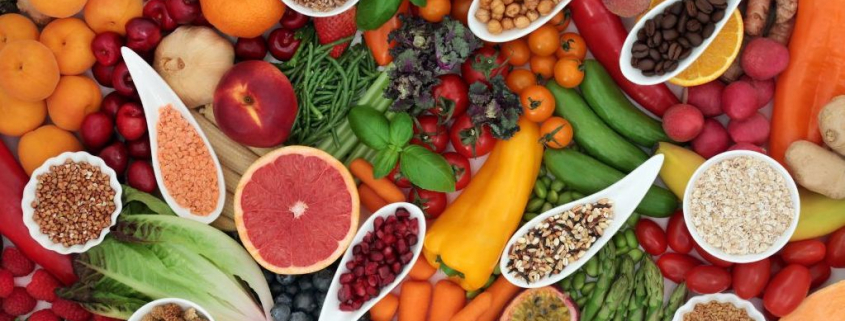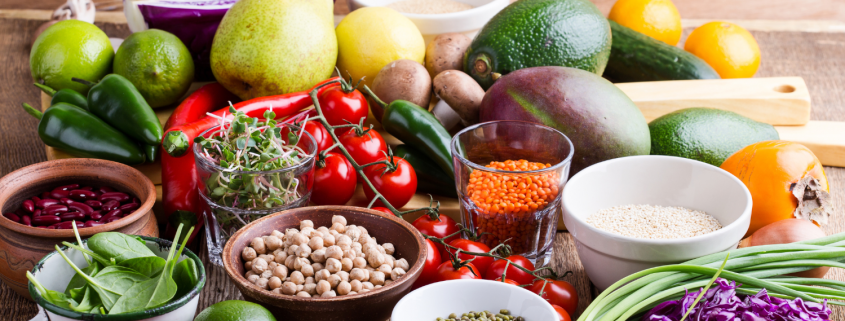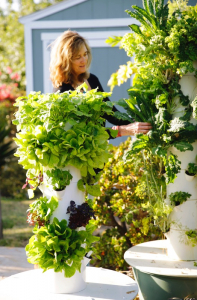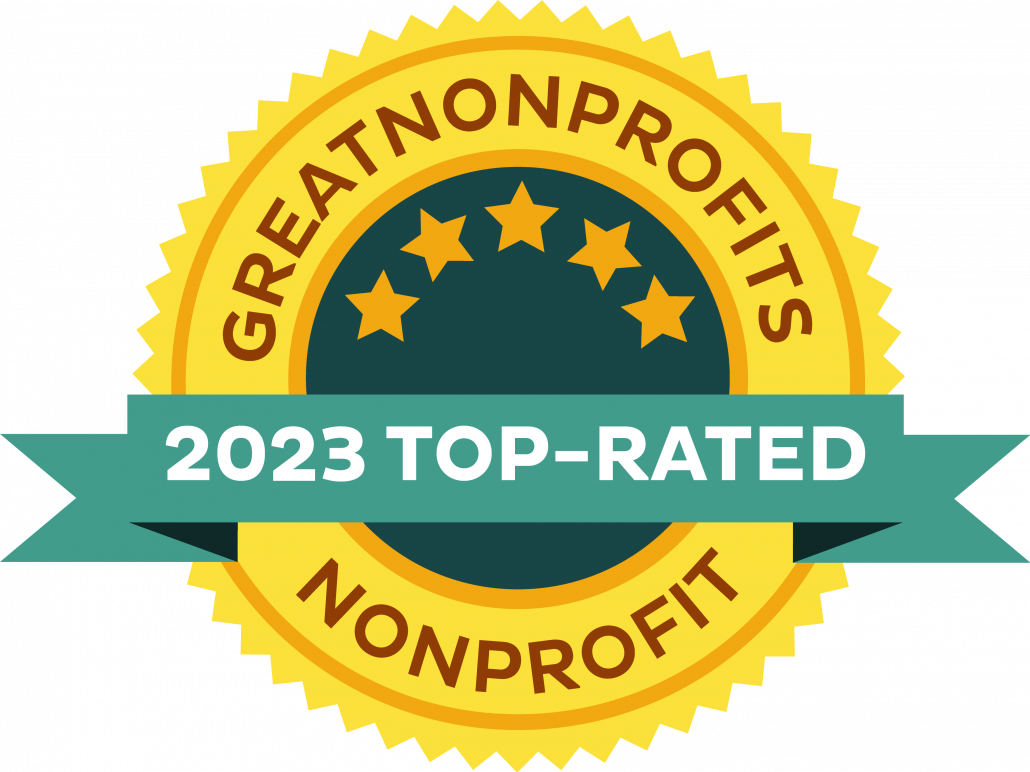Foods that Prevent Cancer
/14 Comments/in Nutrition /by Ariana Barrett“The Key to Starving Cancer: High Fiber & A Healthy Gut”
A Blog Post by Elissa Goodman
Have you heard the idea that we can “starve” our cancer cells? I am not only talking about limiting the harmful foods that fuel their growth. Sure, for most people who have cancer, it is imperative to significantly limit certain foods, like sugar, processed foods and low-quality animal protein, that encourage cancer cells to grow even more. We know that a poor diet is a key factor in increasing your cancer risk. But it goes even further than food being used as cancer fuel. There is a magical aspect of our bodies that actually works to starve cancer from the inside out: the potent cancer-fighting cells that live in our gastrointestinal tract.
If you have taken a basic biology or anatomy class, you have likely heard about the cells that work to strengthen and support the immune system. Like me, your high school years may be a bit behind you, but does the term “Helper T Cell” ring a bell to you? T Cells are the most critical cancer-fighting immune cells in the human body – and research shows that a whopping seventy percent (!!!) of them reside alongside the lining of the GI tract. This is hugely significant because it means that they can be affected by whatever they interact with – the foods we eat and the medications we take. On top of keeping the immune cells in the gut healthy, it is important to keep the rest of the microbiome in the intestinal tract functioning optimally as well because it all relies on each other.
Over the years, the research has seemed to show that, in general, the more variation in intestinal microflora (also known us gut bacteria) someone has, the better their T Cells will stand up to some forms of cancer and the better their immunotherapy response will be. What scientists and doctors are now finding is that it is not just one kind of bacteria in a probiotic that they can prescribe to cancer patients to help with immunotherapy. In fact, recent data has shown that in some cases prescribing a probiotic prior to treatment made the treatment less effective – sometimes by a significant degree. However, what health professionals are discovering is that there is something else they can “prescribe” to increase the likelihood of effective immunotherapy treatment: fiber.
Yes, a high-fiber diet has been shown to increase the chances of successful immunotherapy treatment by fivefold! This is because the good bacteria in the gastrointestinal tract feed off of fiber. So, while it is important to have a healthy microbiome within the gut, it is also very important to be feeding it the correct nutrients. Unfortunately, the data is still limited on what, exactly, the best nutrients are for an optimal gut microbiome for cancer patients. One of the main roadblocks on modern research is the fact that pharmaceutical companies are willing to invest in trials that revolve around immunotherapy drugs, but not on nutrition. That is because there is a lot of money in the medication industry, but it is much harder to patent a certain type of eating pattern than a drug. One thing is clear: a healthy gut positively impacts immunotherapy. There are some steps that you can take today to ensure that your gut microbiome is as healthy as possible – especially if you or a loved one has been diagnosed with cancer.
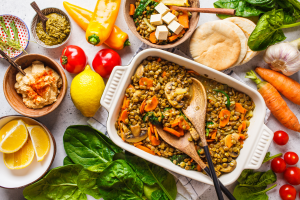
Reduce toxic trigger foods in your diet such as gluten, dairy, sugar, GMO corn & soy, hydrogenated fats, high-fructose corn syrup, artificial sweeteners, processed foods and anything you might be allergic or have a sensitivity to: a food allergy can cause an immune system reaction that affects numerous organs and can be life-threatening. Consider taking a daily probiotic to regenerate healthy bacteria in your gut and improve your immune system (unless you are about to begin immunotherapy treatment in which case, speak with your doctor about whether probiotic supplementation is a good idea for you). My favorite brands for probiotics are Seed, Renew Life and Dr. Ohhira’s. You can also add fermented foods into your diet because they have live probiotic cultures that work to increase the health of your gut and immune system. Some of my favorite fermented foods include coconut kefir, coconut yogurt kefir, sauerkraut, kimchi, kombucha, tempeh, and unpasteurized miso.
You can also supplement daily with L-glutamine, which supports digestion by helping to maintain the mucosal lining of the intestinal tract, which, in turn, supports immune function. Also, it is used throughout the body for tissue repair and immune support. Pure Encapsulations has a fantastic L-Glutamine supplement. I also recommend regularly drinking gut-healing bone broth or adding collagen powder to your nutrient routine. Bone broth contains gelatin- one of the most important nutrients for healing and sealing the gut. It essentially spackles holes in the gut lining, preventing food and bacteria from leaking. My favorite collagen powder is Further Food. You can also take a digestive enzyme because they help to breakdown food better and extract more nutrients. Enzymedica Digest Gold ATPro is wonderful for this. Finally, and most important, add fiber to your diet! Not only does a high-fiber diet fuel the good bacteria in the gut, as I mentioned earlier, it also reduces levels of disease-causing bacteria. We need a minimum of 25 – 35 grams of fiber per day and many people are not consuming anywhere close to that. Some of my favorite sources of fiber are chia seeds, berries, avocados, various legumes and flax seeds.
As always, please speak with a doctor before beginning a new supplement. Happy gut healing!
This post was originally published on Elissa Goodman’s website at – https://elissagoodman.com/health/cancer-fighting-gut-cells/ and The Foundation for Living Beauty was given permission by Elissa to republish on our blog.
To learn more about Elissa Goodman, please visit, https://elissagoodman.com/
The recommendations above are based on the author’s research and findings and do not guarantee the prevention of cancer.
If you enjoyed reading this blog check out this one about cancer-causing foods!
If you would like to support The Foundation for Living Beauty and help provide vital wellness and support services free if charge to women with cancer you can become a monthly donor!
Learn more about Living Beauty here!
Cancer Causing Foods
/0 Comments/in Nutrition /by Ariana BarrettThe Case for Effective Anti-Cancer Lifestyle Therapies
A Blog Post by Elaine Bryan, Body and Soul Nourishment for The Foundation for Living Beauty
It has become more apparent than ever after extensive research on cancer by modern medicine for at least the last 40 years, that cancer rates are still increasing. We are also finding a rise in premature deaths from related causes due to compromised body systems due to the inherent stress on the individual. They are finding that some cancers are treated with a good amount of success but complimenting therapies with integrative lifestyle therapies is imperative to support the whole person in both prevention as well as during treatment of cancer.
Scientists now believe that the aspects of lifestyle related to our diets and weight are responsible for 1/3 of all cancers, a percentage as high as the cause from tobacco. Genetics plays a smaller role in these diagnoses, while malnutrition from an inadequate diet (or situation of not absorbing your nutrients correctly) contributes to the majority of the risk of developing cancer. Our view of eating has been based on an act of merely refueling, a quick and easy way to supply the body with energy essential for our survival centered around calorie consumption. While fruits and vegetables which are low in calories, tend to play a limited role where diets full of an abundance of sugar and fat take precedence in most American diets. Other areas contributing to the risk of cancer include our detoxification system of toxic chemical exposures, our stress management and even our sunlight exposure. If our immune and detoxification systems are supported correctly, we will have a stronger defense system when exposed to these toxic chemicals in the environment as cancer cells rely on a certain environment that is favorable to their growth. Working with inhibiting the creation of that pro-carcinogenic environment is essential to stop cancer from developing and supporting the system at all stages of cancer as well.
Researchers are finding compelling and expanding data showing that radiation and various chemicals in our environment are linked to cases of breast cancer, as well as many other cancers. These environmental toxins include exposure in a person’s life including our personal care products, household products, our food, water and sources of radiation as well. Thus, reducing and eliminating pesticides, herbicides, hormones in foods and chemicals that leach from packaging materials into foods can assist in decreasing our overall toxic load. To find the current 2019 list of the cleanest, and the dirtiest fruits and vegetables from the Environmental Working Group, visit www.ewg.org.
In his book, “The China Study,” Dr. Colin Campbell states that food wins contaminants every time, meaning “the positive impact of anticancer molecules win out over the negative effect of carcinogens.” So if you change your diet, you change your risk and possible outcome!
Research is finding that a low-fat plant-based diet is key and they have also concluded that people who ate the most fruits and vegetables have half the cancer rates as those who ate the least!
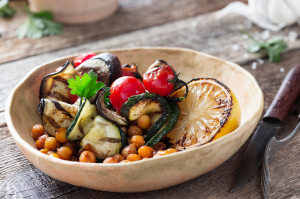
Some of the problematic foods in our western diet include:
- Dietary fats – Diets high in dietary fats are linked to high levels of sex hormones, carcinogens, and mutagens. The compounds live in fat and don’t metabolize out of fat easily, so obtaining cancer-promoting compounds through these high fats, fried and processed foods with fats can be damaging. Omega-6 fats that are highly processed are soybean oils, sunflower oil, corn oil, and cottonseed oil. Not all fat is damaging; as the Omega-3 fats help reduce inflammation and are found in wild fish, grass-finished animals (in moderation), free-roaming, cage-free chickens and eggs, seaweed-like kelp, raw walnuts, pumpkins seeds, hemp and chia seeds.
- High sugar, processed foods – Cancer cells are primary sugar feeders and uptake glucose at 10-12 times the rate of healthy cells and they also suppress the immune system.
- Foods with animal origin are showing a strong connection in certain cases of an increased risk of cancer.
The top foods that have been found to be protective for all cancers include the alliaceous family which includes garlic, leeks, and scallions.
Immediately following is the cruciferous family which includes broccoli, cauliflower, brussel sprouts, cabbage, kale, arugula, bok choy, collards, watercress, and radishes. These vegetables have a profound ability to shield cells from several processes that can transform healthy cells into malignant tumors. The phytochemicals in those veggies are somewhat fragile so chewing and how you prepare them is important to protect some of these protective chemicals.
Some of the other many protective plants that have been found include wild blueberries, organic apples, blackberries, raspberries, red beans, artichoke hearts and many more.
Spices and herbs such as turmeric, garlic, ginger, chili peppers, mint, marjoram, thyme, basil, oregano and rosemary all have amazing food phytochemicals that add flavor to our foods at the same time protect our cells.
Other protective constituents have been discovered in plants such as green tea, pomegranates, many varieties of mushrooms and dark chocolate.
All of these foods have important fiber that assists the body in removing toxins and waste as well. Gluten-free grains including quinoa, millet, amaranth as well as nuts, seeds and flaxseeds, chia and hemp seeds are all very beneficial.
Everyone is different and thus should be checked by your practitioner for any food sensitivities, intolerances or nutrient deficiencies to obtain the best results with nutritional therapies!
To learn more about Elaine Bryan, visit www.bodyandsoulnourishment.com.
The recommendations above are based on the author’s research and findings and do not guarantee the prevention of cancer.
If you liked this post check out this one about foods that prevent cancer!
If you would like to support The Foundation for Living Beauty and help provide vital wellness and support services free if charge to women with cancer you can become a monthly donor!
Learn more about Living Beauty here!
How to Prevent Cancer
/0 Comments/in Holistic Wellness /by Ariana BarrettHow To Prevent Cancer
A blog post for The Foundation for Living Beauty by Jovanka Ciares
If anyone had an infallible answer to the question posed in the title of this article, they would be the most powerful human on earth. Cancer touches each and every one of us. You may have struggled with it yourself, may know someone who is or sadly and seemingly inevitably, love someone who will struggle with this disease in your lifetime.
While we are all vulnerable to the disease, living with pollutants, toxins and other substances known as carcinogens inside our bodies, we need never be passive witnesses to the development of cancer or any other life-threatening disease.
First, cancer does not occur overnight. By the time your doctor finds a tumor, those cancerous cells are years old, evolving deep inside of you and struggling to survive and reproduce as your body’s immunity fights to get rid of them. Secondly, and perhaps more importantly, your body has an uncanny ability to fight the nastiest of organisms and maintain homeostatic (i.e. internal stability, balance and finally, health).
So, is it possible to prevent cancer, a disease that often takes years to manifest? I believe we can. But you can’t wait one more day; you must start today making changes in your diet and lifestyle that will give you a better chance at preventing these cells from multiplying, turning into cancer and robbing you of many great years. My initial guidelines include:
- Become a student of your own body: never again should you rely solely on doctors to confirm your state of health. Listen to the cues your body is giving you and use your intuition to look for alternative practices to help you stay stronger, full of energy and health.
- Start consuming a diet that is 100% whole foods with an 80/20 ratio of plan foods (vegetables, legumes, whole grains) versus animal flesh (meat, fish, dairy, eggs). The goal is to eventually move to a 100% plant-based diet, as the only diet shown to reduce cancer risk across all populations.
- Learn what nutrients are better at preventing cancer and start incorporating them into your diet. In my work as a Clinical Herbalist, I’m often asked which nutrients or plants have anti-cancerous properties. The answer is always: A lot of them! Too many to mention here but not hard to find with a simple Google search. This shows you that you can find multiple options that you personally love and can enjoy each and every day.
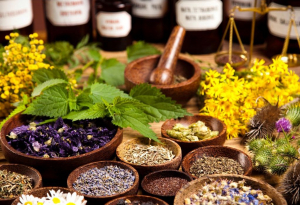
- Learn about alternative treatments like herbalism, Ayurveda and Chinese medicine as a way to complement your diet, supplement and assist in the healing process. Plants as medicine have been used for over 6,500 years by all cultures around the world and today, they are becoming more mainstream to help you in ways that Western medicine cannot: in the prevention of cancer and other life-threatening diseases.
- Work to eliminate from your life all relationships or circumstances that cause you high levels of stress, anxiety or unhappiness. Research suggests that chronic stress can make cancerous cells spread faster. Stress hormones can also compromise your immunity, potentially leading to the development of the disease.
- Embrace regular detox practices like juicing, fasting, sweating or colonics to help reduce the amount of toxins, pollutants, and carcinogens in your system.
While we may never be able to stop the development of diseases like cancer, wouldn’t it be incredible if we can slow it down a few long decades? That’s a bargain I’m happily willing to take.
To learn more about Jovanka, please visit:
http://youtube.com/user/jovankaciares
http://instagram.com/jovankaciares
or contact Jovanka for an herbal medicine/nutrition assessment session: [email protected]

The recommendations above are based on the author’s research and findings and do not guarantee the prevention of cancer.
If you liked this post check out this one about foods that prevent cancer!
If you would like to support The Foundation for Living Beauty and help provide vital wellness and support services free if charge to women with cancer you can become a monthly donor!
Learn more about Living Beauty here!
Educating, uplifting, and empowering women with cancer.
